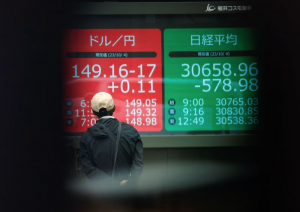Oil tankers sanctioned by the United States have been banned from several key ports in eastern China ports, traders say.
China’s Shandong Port Group issued a notice on Monday banning such vessels from its network of ports, according to three traders who spoke to Reuters.
That decision potentially restricts blacklisted vessels from major energy terminals on China’s east coast.
ALSO SEE: Tencent and CATL Shares Sink After Listing by US Defence Dept
The notice, shared with Reuters by two traders and confirmed by a third, forbids ports to dock, unload or provide ship services to vessels on the Office of Foreign Assets Control list managed by the US Department of Treasury.
Shandong Port Group oversees major ports on China’s east coast including Qingdao, Rizhao, Yantai which are major terminals for importing sanctioned oil.
Shandong Port Group did not respond to calls from Reuters.
China wary of sanctions as US targets ‘shadow fleet’
Reasons for the Port Group’s decisions are not known, but Beijing appears to be wary of further sanctions by the US at a time when it is eager to do a trade deal with President-elect Donald Trump to avoid hefty tariffs being imposed on Chinese products by the incoming administration.
The decision comes at a time when the US Department of Defence has blacklisted COSTCO, China’s top shipping line, and a range of other companies for alleged links to military activities.
There have also been reports that the Biden Administration plans to sanction a large number of additional “shadow fleet” tankers involved in the Russian energy trade.
The US Treasury has more than 200 Russian vessels of various types on its blacklist, and a final round of designations could make the list far longer, two officials told Reuters last weekend.
The new package targets tankers from the lightly-regulated fleet that now carries the majority of Russian oil exports: shipments priced over the G7 “cap” of $60 per barrel.
The carefully-calibrated cap was intended to restrict the amount of money that Russia could earn without cutting down on its export volume, thereby keeping global energy supplies – and prices – as steady as possible.
In practice, Russia’s ESPO oil grade never fell below $60, and Russian Urals exports quickly exceeded the cap, enabled by a burgeoning fleet of non-Western tankers. These vessels are typically older than 15 years and flagged in low-governance jurisdictions like Gabon or the Cook Islands.
According to Platts, Russia’s “shadow fleet” now numbers about 600 ships, primarily MRs, LRs and Aframaxes, vessels suitable for operations in the Baltic. Sanctions-evading tankers now carry more than 80% of all Russian oil, according to Platts, raising questions about the effectiveness of the G7 price cap.
Over the years, the US has had some success combating oil trafficking by imposing blocking sanctions on specific ships.
Transacting with a US-sanctioned vessel can expose any service provider to the risk of severe penalties from the Treasury; this is enough to dissuade many banks, suppliers, terminal operators and flag registries (though not all).
Leveraging this strategy one last time, Biden aides plan to impose sanctions on more than 100 tankers, along with various oil companies, oil traders, and Russian insurance companies, one official told Reuters.
However, the future of the list under President-elect Donald Trump is uncertain. In July 2024, during the campaign, Trump expressed ambivalence about sanctions on Russia. “So what we’re doing with sanctions is we’re forcing everyone away from us. So I don’t love sanctions,” he was quoted as saying.
America’s allies in Europe have been looking carefully at ways to maintain a tough sanctions regime on Russian oil shipping in case the next administration lifts existing restrictions.
“Should a Trump presidency reverse US sanctions on Russia, Europeans will need to be much more muscular in . . . enforcement action and will no longer be able to hide behind Uncle Sam,” analyst Tom Keatinge of the Royal United Services Institute told Reuters in October.
- Reuters with additional input and editing by Jim Pollard
ALSO SEE:
Russian Tankers Sink in Black Sea, US Warns on ‘Dark Fleet’
US ‘Looking Closely’ at China Banks Over War Aid to Russia
US Warns China of Sanctions: ‘Helping Russia Threatens Europe’
China Providing 90% of Chips Used in Russia, Despite Sanctions
Chinese, Russian Firms Agree Multiple Deals as Ties Deepen
Chinese Loans to Russia Quadruple Since Ukraine War – FT
China Imports of Russian Oil Rise to Near-Record Levels
Fear of US Sanctions Delaying Oil Payments to Russia, Banks Say
China-Russia Trade ‘Goes Underground’ as Big Banks Pull Back
US Looking to Ban Sales of China’s TP-Link Routers
China’s DJI Halts Drone Sales in Russia, Ukraine Over War Risks
Fear of US Sanctions Delaying Oil Payments to Russia, Banks Say
























